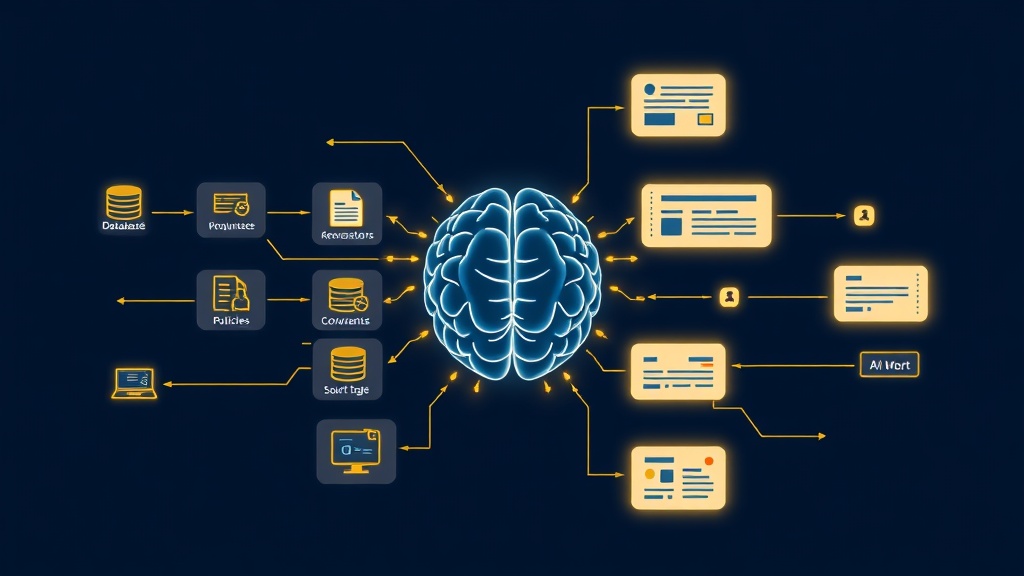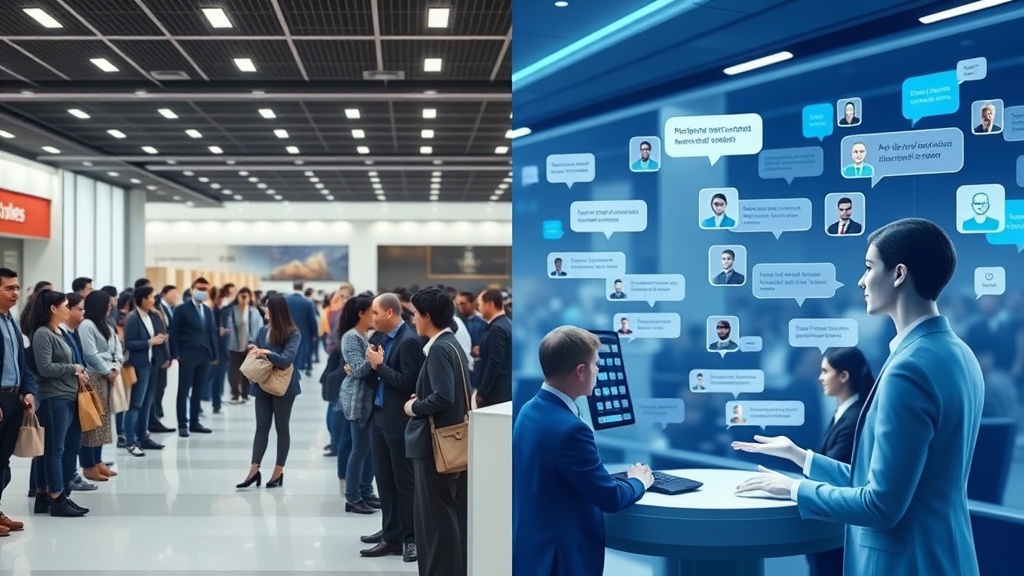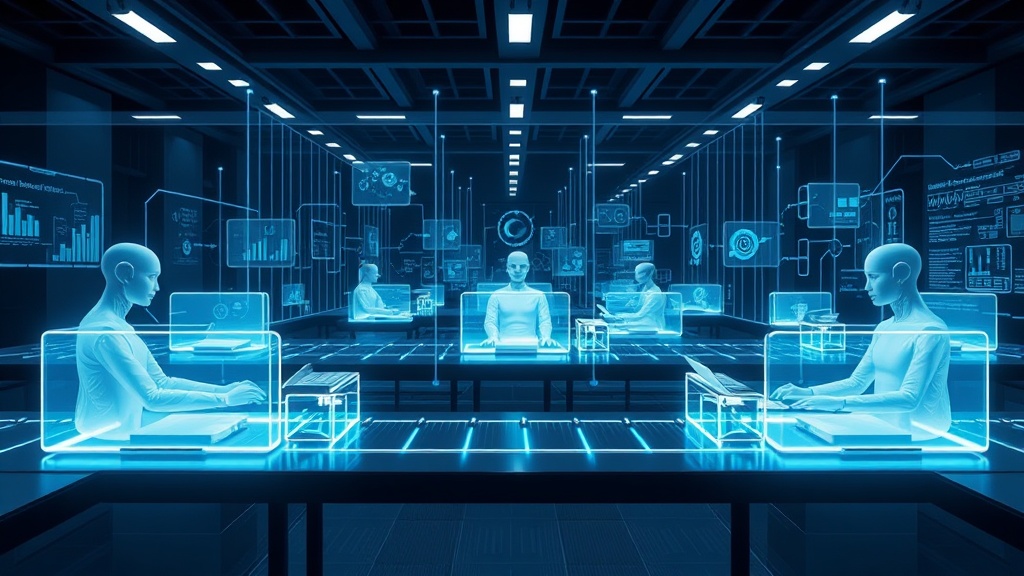
RAG: Cómo Transformar el Conocimiento de tu Empresa en Poder Conversacional Instantáneo
Descubre cómo la tecnología RAG (Generación Aumentada por Recuperación) permite a las empresas transformar el conocimiento corporativo fragmentado en recursos conversacionales unificados e instantáneamente accesibles, con empresas logrando ahorros multimillonarios y mejora en la toma de decisiones mediante acceso en tiempo real a bases de datos internas, documentos y políticas.
Cada empresa posee una mina de oro de conocimiento—años de documentación, políticas, datos de clientes, especificaciones técnicas y sabiduría institucional dispersa en bases de datos, drives y documentos. Hasta ahora, acceder a este conocimiento requería búsquedas manuales, conocimiento tribal o consultas largas. RAG (Generación Aumentada por Recuperación) cambia todo, transformando información estática en inteligencia conversacional dinámica que responde instantáneamente a cualquier consulta.
Entendiendo RAG: El Puente Entre Conocimiento y Conversación
RAG representa un avance fundamental en arquitectura de inteligencia artificial. A diferencia de los Modelos de Lenguaje Grande (LLM) estándar que dependen únicamente de datos de entrenamiento fijos, RAG combina el poder generativo de los LLM con recuperación de información en tiempo real de fuentes externas. Este enfoque híbrido permite a los sistemas de IA acceder y utilizar datos específicos y actuales de repositorios empresariales mientras mantienen las capacidades conversacionales naturales de modelos de lenguaje avanzados.
La distinción es crucial para aplicaciones empresariales. Mientras que un LLM estándar podría proporcionar respuestas genéricas basadas en su entrenamiento, un sistema mejorado con RAG extrae directamente de la documentación específica de tu empresa, bases de datos y repositorios de conocimiento. No solo sabe sobre las mejores prácticas de servicio al cliente—conoce tus protocolos específicos de servicio al cliente, tus especificaciones de producto y tus procesos comerciales únicos.
Esta tecnología cierra la brecha entre el conocimiento vasto pero general de los modelos de IA y la información específica y propietaria que hace único a tu negocio. Cada respuesta está fundamentada en tus datos reales, asegurando precisión, relevancia y alineación con tu realidad organizacional.
La Revolución del Conocimiento Empresarial
RAG transforma el conocimiento corporativo fragmentado en un recurso conversacional unificado e instantáneamente accesible. La información previamente enterrada en PDFs, hojas de cálculo, bases de datos y wikis internas se vuelve inmediatamente disponible a través de consultas en lenguaje natural. Los empleados ya no necesitan saber dónde está almacenada la información o cómo acceder a sistemas específicos—simplemente preguntan, y RAG recupera y sintetiza la respuesta.
Esta transformación impacta cada departamento. Los representantes de servicio al cliente acceden a especificaciones de producto y guías de resolución de problemas instantáneamente. Los equipos de RRHH recuperan información de políticas y datos de empleados sin problemas. Los equipos de ventas obtienen inteligencia competitiva e información de precios en tiempo real. Los departamentos legales analizan contratos y documentación de cumplimiento en segundos.
La unificación de fuentes de conocimiento elimina los silos de información que han plagado a las organizaciones durante décadas. A RAG no le importa si la información reside en un CRM, ERP, sistema de gestión documental o archivo de email—accede a todo simultáneamente, creando respuestas completas que ningún sistema individual podría proporcionar.
Aplicaciones del Mundo Real: RAG en Acción
Chatbots Corporativos con Conocimiento Profundo
Los chatbots corporativos modernos impulsados por RAG pueden consultar regulaciones internas y bases de datos en tiempo real para resolver consultas complejas. Cuando un empleado pregunta sobre excepciones de política de vacaciones para trabajadores remotos en países específicos, el sistema RAG recupera instantáneamente políticas de RRHH relevantes, leyes laborales locales y casos precedentes, sintetizando una respuesta precisa y accionable.
Estas no son respuestas programadas ni árboles de decisión. El chatbot entiende contexto, interpreta matices y genera respuestas que abordan directamente la situación específica, todo mientras extrae de fuentes corporativas autorizadas.
Asistentes Inteligentes para Empleados
Las organizaciones están desplegando asistentes impulsados por RAG que acceden a informes, documentos y datos empresariales para generar resúmenes inteligentes y propuestas. Un gerente de proyecto que solicita una actualización de estado recibe no solo información actual de hitos sino insights sintetizados de múltiples herramientas de gestión de proyectos, comunicaciones de equipo y bases de datos de recursos.
Estos asistentes no solo recuperan información—analizan, sintetizan y presentan en formatos optimizados para la toma de decisiones. Los datos complejos se convierten en inteligencia accionable, entregada conversacionalmente en segundos en lugar de horas de compilación manual.
Sistemas Legales y de Cumplimiento
Los departamentos legales aprovechan RAG para analizar jurisprudencia y documentación en segundos, apoyando decisiones rápidas de cumplimiento. Cuando emergen nuevas regulaciones, los sistemas RAG identifican instantáneamente políticas, contratos y procedimientos afectados, generando evaluaciones de impacto completas y acciones recomendadas.
La transformación de velocidad es dramática. Tareas que requerían días de revisión manual de documentos ahora se completan en minutos, con mayor precisión y completitud de lo que la revisión humana sola podría lograr.
Plataformas Educativas Adaptativas
Las plataformas de formación corporativa que usan RAG adaptan contenido basado en vastos repositorios de información académica y corporativa. En lugar de módulos de formación genéricos, los empleados reciben experiencias de aprendizaje personalizadas que incorporan procesos específicos de la empresa, mejores prácticas de la industria e historiales de aprendizaje individuales.
El sistema puede extraer de manuales técnicos, informes de industria, estudios de caso internos y bases de conocimiento de expertos para crear contenido de formación perfectamente alineado tanto con estándares corporativos como con necesidades de desarrollo individuales.
La Ventaja Competitiva: Velocidad, Coste y Precisión
RAG ofrece un equilibrio óptimo entre velocidad, coste y precisión que enfoques alternativos no pueden igualar. Crear LLM personalizados requiere inversiones masivas en datos de entrenamiento, recursos computacionales y mantenimiento continuo. El ajuste fino de modelos existentes arriesga perder capacidades generales mientras gana conocimiento específico. RAG evita completamente estas limitaciones.
Los costes de implementación permanecen manejables porque RAG aprovecha LLM existentes sin modificación. El componente de recuperación puede utilizar infraestructura de base de datos actual y tecnologías de búsqueda. Las organizaciones logran capacidades de IA específicas para empresas sin inversiones de escala empresarial en IA.
La ventaja de precisión es igualmente convincente. Cada respuesta RAG puede citar fuentes específicas, permitiendo verificación y construyendo confianza. Los usuarios saben si la información proviene de políticas oficiales, informes recientes o datos históricos. Esta transparencia es crucial para industrias reguladas y toma de decisiones de alto riesgo.
Privacidad y Control: Tus Datos, Tus Reglas
RAG mantiene control completo sobre fuentes de información, abordando preocupaciones críticas de privacidad y seguridad. A diferencia de servicios de IA en la nube que podrían entrenar con tus datos, RAG mantiene tu información dentro de tu infraestructura. Los datos sensibles nunca salen de tu entorno, y los controles de acceso permanecen bajo tu gestión.
Esta ventaja arquitectónica resulta esencial para industrias que manejan información confidencial—sectores de salud, finanzas, legal y gobierno pueden aprovechar el poder de la IA sin comprometer la soberanía de datos. El cumplimiento con GDPR, HIPAA y otras regulaciones se vuelve manejable cuando los datos nunca salen de entornos controlados.
Las organizaciones pueden exponer información selectivamente a diferentes grupos de usuarios. El RAG de servicio al cliente podría acceder a información de producto y políticas públicas, mientras que los sistemas RAG ejecutivos acceden a datos financieros y planes estratégicos. El control granular asegura que los usuarios reciban información relevante sin acceso inapropiado.
La Proyección de Gartner: Impacto Multimillonario
Gartner proyecta que la IA conversacional con soporte RAG generará ahorros multimillonarios mientras acelera la toma de decisiones empresariales. Estas proyecciones no son especulativas—los adoptantes tempranos ya reportan retornos significativos a través de tiempo de búsqueda reducido, menos errores y mejor calidad de decisiones.
Los ahorros se componen a través de múltiples dimensiones. Las reducciones de coste directo provienen de tiempo reducido buscando información y trabajo duplicado disminuido. Los ahorros indirectos emergen de mejores decisiones, resolución de problemas más rápida y satisfacción del cliente mejorada. Las ventajas estratégicas se desarrollan a medida que las organizaciones se vuelven más ágiles y receptivas.
La aceleración de la toma de decisiones resulta igualmente valiosa. Cuando los ejecutivos pueden acceder instantáneamente a análisis de mercado completo, inteligencia competitiva y datos de rendimiento interno a través de consultas conversacionales, la formación de estrategia se acelera dramáticamente. RAG transforma datos de un registro histórico a un activo estratégico en tiempo real.
Estrategias de Implementación: De Estático a Dinámico
La implementación exitosa de RAG requiere planificación reflexiva pero no demanda cambios revolucionarios. Las organizaciones típicamente comienzan con casos de uso de alto valor y bien definidos—soporte al cliente, incorporación de empleados o documentación técnica. Estos despliegues iniciales demuestran valor mientras construyen experiencia institucional.
La preparación de datos resulta crucial pero no abrumadora. La documentación existente no requiere perfección—los sistemas RAG sobresalen en extraer valor de información imperfecta. Sin embargo, organizar e indexar fuentes de información mejora la precisión de recuperación y la calidad de respuesta.
La integración con sistemas existentes ocurre incrementalmente. RAG puede inicialmente acceder a bases de datos de solo lectura y repositorios de documentos, expandiéndose a sistemas transaccionales a medida que crece la confianza. Este enfoque por etapas minimiza el riesgo mientras maximiza las oportunidades de aprendizaje.
El Futuro: Más Allá de la Simple Recuperación
La tecnología RAG continúa evolucionando rápidamente. Las implementaciones avanzadas ahora incorporan recuperación multimodal, accediendo no solo a texto sino a imágenes, vídeos y datos estructurados. La comprensión semántica mejora continuamente, permitiendo interpretación más matizada tanto de consultas como de información recuperada.
Los desarrollos futuros prometen capacidades aún mayores. Los sistemas RAG predecirán necesidades de información antes de que se hagan las consultas, ofreciendo proactivamente insights relevantes. La integración con otras capacidades de IA—visión, habla y robótica—creará asistentes empresariales verdaderamente inteligentes.
La convergencia de RAG con agentes autónomos permitirá sistemas que no solo recuperan y sintetizan información sino que toman acción basada en ese conocimiento. Imagina sistemas RAG que identifiquen problemas, investiguen soluciones e implementen correcciones—todo mientras mantienen documentación perfecta de su proceso de decisión.
Desbloquea Tu Conocimiento Hoy
Transforma la información dispersa de tu empresa en inteligencia conversacional instantánea. En txat by gako.ai, las capacidades RAG avanzadas están integradas, conectándose sin problemas con tus fuentes de datos existentes para crear agentes inteligentes en minutos.
Comienza tu prueba gratuita en txat y observa cómo tu conocimiento estático se convierte en poder conversacional dinámico.


